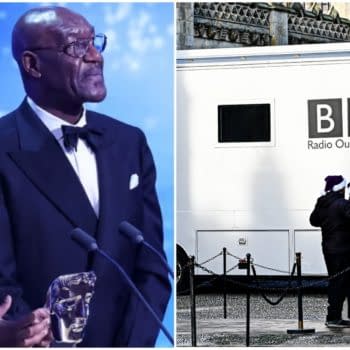Posted in: Movies, Universal | Tagged: film, last christmas, paul feig, Universal Pictures
Paul Feig Reflects on the Biggest Change Made to Last Christmas
The director of the 2019 romantic comedy Last Christmas discusses how the film was required to change, and why he disagreed with the pivot.
Article Summary
- Paul Feig opens up about the forced changes made to Last Christmas after negative test screenings.
- The original introduction of Emilia Clarke's character was deemed too unsympathetic by audiences.
- Feig criticizes the gender bias that made viewers less forgiving of a flawed female protagonist.
- Last Christmas continues to spark discussions on complex women leads and audience expectations.
When Last Christmas premiered in 2019, it was met with mixed reviews despite its festive packaging, a charismatic cast, and a twist-heavy narrative that attempted to add emotional weight to the holiday rom-com genre. Directed by Bridesmaids and A Simple Favor filmmaker Paul Feig, the film stars Emilia Clarke as Kate, a disillusioned Christmas shop employee struggling through a series of personal setbacks until she meets the mysterious and optimistic Tom, played by Henry Golding. Written by Emma Thompson, Last Christmas was inspired by the music of George Michael and aimed to present a modern, bittersweet take on seasonal storytelling. And while the film has since garnered a cult following for its heart and originality, Feig recently spoke candidly about early challenges during its release, particularly with test audiences.

Paul Feig Reveals the Early Plans for His Film Last Christmas
In a conversation with Collider, Feig revealed that the film's original introduction of Clarke's character drew sharp criticism from viewers during early screenings. "Emilia Clarke's character is really in a bad place in her life. Emma Thompson wrote the movie, and when we meet her, she's really a mess. She's yelling and screaming and all this stuff. We thought it was brilliant," Feig explained. "We just loved that we're meeting her in a really bad place. Test audiences just hated it, and it's really unfair. I think it's a misogynistic thing, but it comes from women in the audience, too. People are much more forgiving of a guy who's a mess than they are of a woman who's a mess, and it's really fucked up. We had a bunch of test audiences. We kept trying to test and see if they would warm up to it. So, we had to reshoot the opening to make her a little more sympathetic, and I think it sucks."
Feig's remarks reignite discussions about gender bias in film and audience perception, especially in genres that rely on empathy for flawed leads. Though for some, as Last Christmas continues to gain seasonal reappraisal, it may also serve as another opportunity to examine how audiences receive complex female protagonists in mainstream cinema (regardless of the genre).















